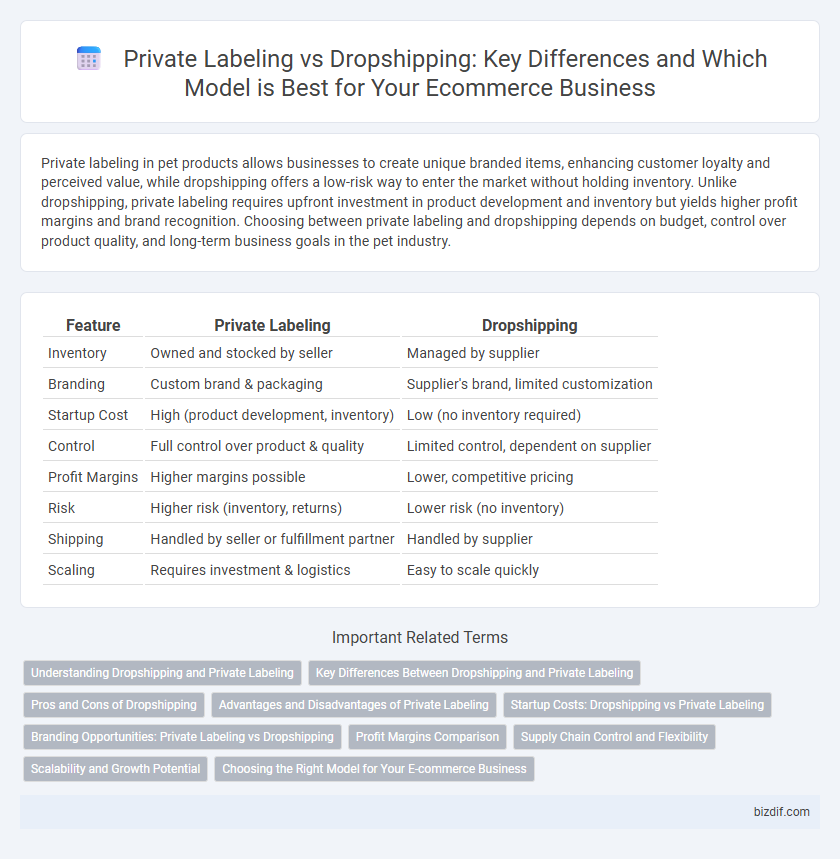Private labeling in pet products allows businesses to create unique branded items, enhancing customer loyalty and perceived value, while dropshipping offers a low-risk way to enter the market without holding inventory. Unlike dropshipping, private labeling requires upfront investment in product development and inventory but yields higher profit margins and brand recognition. Choosing between private labeling and dropshipping depends on budget, control over product quality, and long-term business goals in the pet industry.
Table of Comparison
| Feature | Private Labeling | Dropshipping |
|---|---|---|
| Inventory | Owned and stocked by seller | Managed by supplier |
| Branding | Custom brand & packaging | Supplier's brand, limited customization |
| Startup Cost | High (product development, inventory) | Low (no inventory required) |
| Control | Full control over product & quality | Limited control, dependent on supplier |
| Profit Margins | Higher margins possible | Lower, competitive pricing |
| Risk | Higher risk (inventory, returns) | Lower risk (no inventory) |
| Shipping | Handled by seller or fulfillment partner | Handled by supplier |
| Scaling | Requires investment & logistics | Easy to scale quickly |
Understanding Dropshipping and Private Labeling
Dropshipping allows retailers to sell products directly from suppliers without holding inventory, minimizing upfront costs and risks. Private labeling involves branding these products with a retailer's own logo and packaging, offering greater control over product identity and customer perception. Understanding these models helps entrepreneurs choose between lower barriers to entry through dropshipping or higher brand differentiation with private labeling.
Key Differences Between Dropshipping and Private Labeling
Dropshipping involves selling products directly from suppliers without holding inventory, while private labeling requires manufacturing or sourcing products branded under your own label. Key differences include control over product quality and branding, with private labeling offering greater customization and brand recognition compared to dropshipping's reliance on third-party suppliers. Profit margins tend to be higher in private labeling due to exclusive branding, whereas dropshipping offers lower upfront costs and reduced risk.
Pros and Cons of Dropshipping
Dropshipping offers the advantage of low startup costs and reduced inventory management, allowing entrepreneurs to launch businesses with minimal financial risk and operational complexity. However, drawbacks include lower profit margins due to supplier fees, limited control over product quality and shipping times, and increased competition as barriers to entry are low. Merchants must carefully evaluate supplier reliability and customer service capabilities to maintain brand reputation while leveraging the flexibility of dropshipping.
Advantages and Disadvantages of Private Labeling
Private labeling offers brand control and higher profit margins by allowing sellers to customize products and build brand loyalty, but it requires upfront investment in inventory and longer lead times. Unlike dropshipping, private labeling demands more involvement in quality control, packaging, and marketing efforts to differentiate products in competitive markets. The trade-off involves balancing the benefit of exclusive branding against the risks of inventory management and initial capital commitment.
Startup Costs: Dropshipping vs Private Labeling
Startup costs for dropshipping are significantly lower than private labeling, as dropshipping eliminates inventory expenses and upfront product manufacturing fees. Private labeling requires investment in product design, packaging, and bulk purchasing, leading to higher initial capital requirements. Entrepreneurs seeking minimal financial risk often favor dropshipping, while private labeling appeals to those willing to invest for brand control and customization.
Branding Opportunities: Private Labeling vs Dropshipping
Private labeling offers significant branding opportunities by allowing businesses to create and customize products under their own brand name, enhancing customer loyalty and market differentiation. Dropshipping typically limits branding potential since products are sourced from third-party suppliers, often with generic packaging and less control over product presentation. Choosing private labeling empowers entrepreneurs to develop a unique brand identity, while dropshipping prioritizes ease of operation over brand exclusivity.
Profit Margins Comparison
Private labeling generally offers higher profit margins than dropshipping due to control over branding and product pricing, allowing sellers to set premium prices. Dropshipping typically has lower profit margins as it depends on third-party suppliers who dictate wholesale costs and limit pricing flexibility. Businesses choosing private labeling invest more upfront but benefit from greater long-term profitability compared to the lower-risk, lower-margin dropshipping model.
Supply Chain Control and Flexibility
Private labeling offers greater supply chain control by allowing businesses to customize products and packaging, ensuring brand consistency and quality assurance throughout the production process. Dropshipping provides higher flexibility by eliminating inventory management and shipping responsibilities, enabling sellers to quickly adapt to market trends without significant upfront investment. Choosing between private labeling and dropshipping depends on the desired level of control versus operational agility in supply chain management.
Scalability and Growth Potential
Private labeling offers higher scalability and growth potential by enabling brand differentiation, customer loyalty, and premium pricing, whereas dropshipping typically limits scalability due to reliance on third-party suppliers and lower profit margins. Entrepreneurs using private labeling can scale operations by expanding product lines and investing in marketing, while dropshipping growth often plateaus as product control and inventory management remain constrained. Sustainable growth is more achievable through private labeling, leveraging unique brand assets and direct customer relationships.
Choosing the Right Model for Your E-commerce Business
Private labeling offers greater control over branding, product quality, and customer experience, making it ideal for businesses aiming to build a strong brand identity. Dropshipping requires less upfront investment and inventory management, providing flexibility and scalability for entrepreneurs testing various products or markets. Evaluating factors like budget, brand goals, and operational capabilities is crucial when choosing between private labeling and dropshipping for your e-commerce strategy.
Private labeling vs dropshipping Infographic

 bizdif.com
bizdif.com